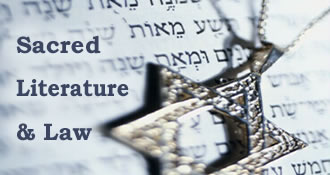
The Scriptures, beginning with the Bible and including the many works of exegesis and commentary, such as the Talmud, the Kabbalah, and other writings-occupy such a central and special place in Judaism that the Hebrew name for this sacred literature, Torah, cannot be adequately translated into any other language. As someone once aptly summed it up: other religions have a concept of Scripture as deriving from Heaven, but only Judaism seems to be based on the idea that the Torah Scripture is itself Heaven. In other words, the Torah of the Jews is the essence of divine revelation; it is not only a basis for social, political, and religious life but is in itself something of supreme value.
This perception of the nature of Torah is derived from the fact that the Torah in all its different forms is a collection of concentrated emanations and transmutations of divine wisdom. Thus, the Torah as apprehended by us is only a particular aspect of that divine essence, just as the world is a particular mode of divine revelation. The Torah is, if anything, an even clearer and more perfect manifestation than the world. As the sages have said: "before Creation, God looked into the Torah and made the world accordingly." By which it is implied that the Torah is the original pattern, or inner plan, of the world: Torah and world are, inseparably, a pair.
Since the Torah expresses the inner will, the direction and mode of operation of the relations between the world and God, it is the spiritual map of the universe. It is not, however, a static chart of things as they are but a dynamic plan of the ever-changing world, charting the necessary course for moving toward a union with God. This means that in its primary essence Torah is the manifestation of the divine wisdom; but like the created world, it has to be expressed through limited forms, like words, and even the physical substance that carries the words, in order to bring the revelation down to the world of action.
Intellectual and emotional immersion in Torah is therefore a way of making contact with the essence of all the worlds on various levels. For the Torah expresses the divine will, and wisdom itself, in all the worlds; whereas in the world of action the divine will express itself only in terms of the immediately surrounding reality. And the limitations of this reality in our world, which are experienced through the reign of nature, are extreme; they can be overcome only through man's freedom of choice. The relation between Torah and the world is thus the relation between idea and actualization, between vision and fulfillment. So that the intellectual study of Torah and the emotional involvement in its contents are a form of identification with the divine will, with what may be called God's dream of the existence of the world and the existence of man. One who is immersed in Torah becomes a partner of God, in the sense that man on one hand and God on the other are participating in the planning, the spinning out of the idea, the common dream of the existence of the world.
One of the means of contact between Torah and the world, then, is this emotional and intellectual contact involved in its study. But there is also another side to the Torah, that of being the Law, of compelling men to behave in certain ways. For the Torah is, to a large extent, a plan of human action and relationship, providing guidance for what is the proper way to behave, think, dream, desire in order that the Torah's design for the world be realized. In this respect the Torah is a way of life, showing both how to relate inwardly and how to conduct oneself outwardly, practically. And that perhaps is why the word "Torah" is of the same root as the word hora'ah ("instructions" or "teaching"), providing as it does a guide to the path of God.

